Related Research Articles

The Nazi Party, officially the National Socialist German Workers' Party, was a far-right political party in Germany active between 1920 and 1945 that created and supported the ideology of Nazism. Its precursor, the German Workers' Party, existed from 1919 to 1920. The Nazi Party emerged from the extremist German nationalist, racist and populist Freikorps paramilitary culture, which fought against the communist uprisings in post–World War I Germany. The party was created to draw workers away from communism and into völkisch nationalism. Initially, Nazi political strategy focused on anti–big business, anti-bourgeois, and anti-capitalist rhetoric. This was later downplayed to gain the support of business leaders, and in the 1930s, the party's main focus shifted to antisemitic and anti-Marxist themes. The party had little popular support until the Great Depression.
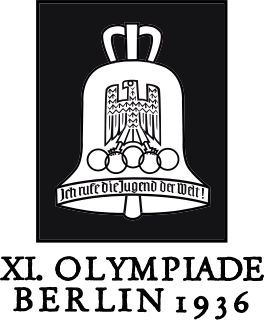
The 1936 Summer Olympics, officially known as the Games of the XI Olympiad and commonly known as Berlin 1936 or the Nazi Olympics, were an international multi-sport event held from 1 to 16 August 1936 in Berlin, Germany. Berlin won the bid to host the Games over Barcelona at the 29th IOC Session on 26 April 1931. The 1936 Games marked the second and most recent time the International Olympic Committee gathered to vote in a city that was bidding to host those Games. Later rule modifications forbade cities hosting the bid vote from being awarded the games.

The Munich Agreement was an agreement concluded at Munich on 30 September 1938, by Germany, the United Kingdom, France, and Italy. It provided "cession to Germany of the Sudeten German territory" of Czechoslovakia, despite the existence of a 1924 alliance agreement and 1925 military pact between France and the Czechoslovak Republic, for which it is also known as the Munich Betrayal. Most of Europe celebrated the Munich agreement, which was presented as a way to prevent a major war on the continent. The four powers agreed to the German annexation of the Czechoslovak borderland areas named the Sudetenland, where more than three million people, mainly ethnic Germans, lived. Adolf Hitler announced that it was his last territorial claim in Northern Europe.
Führer is a German word meaning "leader" or "guide". As a political title, it is strongly associated with the Nazi dictator Adolf Hitler.
The events preceding World War II in Europe are closely tied to the bellicosity of Fascist Italy, Nazi Germany, and Imperial Japan, as well as the Great Depression. The peace movement led to appeasement and disarmament.

Werner Eduard Fritz von Blomberg was a German General Staff officer and the first Minister of War in Adolf Hitler's government. After serving on the Western Front in World War I, Blomberg was appointed chief of the Truppenamt during the Weimar Republic. Following the Nazis' rise to power, he was named Minister of War and Commander-in-Chief of the German Armed Forces. In this capacity, Blomberg played a central role in Germany's military build-up during the years leading to World War II. However, by 20 January 1938, he was forced to resign after his rivals, Hermann Göring and Heinrich Himmler, presented Hitler with evidence that his wife had posed in the past for pornographic photos.

The causes of World War II, a global war from 1939 to 1945 that was the deadliest conflict in human history, have been given considerable attention by historians from many countries who studied and understood them. The immediate precipitating event was the invasion of Poland by Nazi Germany on September 1, 1939, and the subsequent declarations of war on Germany made by Britain and France, but many other prior events have been suggested as ultimate causes. Primary themes in historical analysis of the war's origins include the political takeover of Germany in 1933 by Adolf Hitler and the Nazi Party; Japanese militarism against China, which led to the Second Sino-Japanese War; Italian aggression against Ethiopia, which led to the Second Italo-Ethiopian War and Germany's initial success in negotiating the Molotov–Ribbentrop Pact with the Soviet Union to divide the territorial control of Eastern Europe between them.

Otto Ernst Remer was a German Wehrmacht officer in World War II who played a major role in stopping the 20 July plot in 1944 against Adolf Hitler. In his later years he became a politician and far right activist. He co-founded the Socialist Reich Party in West Germany in the 1950s and is considered an influential figure in post-war neo-fascist politics in Germany.
The early timeline of Nazism begins with its origins and continues until Hitler's rise to power.
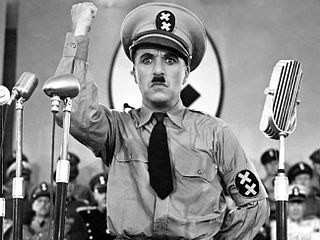
Adolf Hitler, dictator of Germany from 1933 to 1945, has been represented in popular culture ever since he became a well-known politician in Germany. His distinctive image was often parodied by his opponents. Parodies became much more prominent outside Germany during his period in power. Since the end of World War II representations of Hitler, both serious and satirical, have continued to be prominent in popular culture, sometimes generating significant controversy. In many periodicals, books, and movies, Hitler and Nazism fulfill the role of archetypal evil. This treatment is not confined to fiction but is widespread amongst nonfiction writers who have discussed him in this vein. Hitler has retained a fascination from other perspectives; among many comparable examples is an exhibition at the German Historical Museum which was widely attended.
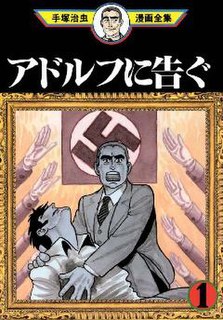
Message to Adolf, known in earlier English versions as Adolf, is a manga series made by Osamu Tezuka. The story is set before, during, and after World War II and is centered on three men with the name Adolf. Adolf Kamil is an Ashkenazi Jew living in Japan. His best friend Adolf Kaufmann is of both Japanese and German descent. The third Adolf is Adolf Hitler, the dictator of Germany. Adolf also features Sohei Toge, a Japanese reporter, and his quest for documents that could turn the tide of the war. The work explores the themes of nationality, ethnicity, racism, and war, and includes elements of coming of age, spy fiction, and historical drama.

The flag of Nazi Germany, officially the flag of the German Reich, featured a red background with a black swastika on a white disc. This flag came into use initially as the banner of the Nazi Party (NSDAP) after its foundation. Following the appointment of Adolf Hitler as Chancellor in 1933, this flag was adopted as one of the nation's dual national flags, the other being the black-white-red triband of the German Empire.
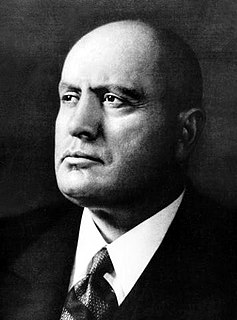
This timeline of events preceding World War II covers the events of the interwar period (1918–1939) after World War I that affected or led to World War II.
The New Order of Europe was the political order which Nazi Germany wanted to impose on the conquered areas under its dominion. The establishment of the Neuordnung had already begun long before the start of World War II, but was publicly proclaimed by Adolf Hitler in 1941: "The year 1941 will be, I am convinced, the historical year of a great European New Order!"
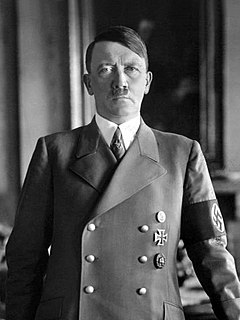
Adolf Hitler was an Austrian-born German politician who was dictator of Germany from 1933 until his death in 1945. He rose to power as the leader of the Nazi Party, becoming the chancellor in 1933 and then taking the title of Führer und Reichskanzler in 1934. During his dictatorship, he initiated World War II in Europe by invading Poland on 1 September 1939. He was closely involved in military operations throughout the war and was central to the perpetration of the Holocaust, the genocide of about six million Jews and millions of other victims.

Fascism in Europe was the set of various fascist ideologies which were practised by governments and political organisations in Europe during the 20th century. Fascism was born in Italy following World War I, and other fascist movements, influenced by Italian Fascism, subsequently emerged across Europe. Among the political doctrines which are identified as ideological origins of fascism in Europe are the combining of a traditional national unity and revolutionary anti-democratic rhetoric which was espoused by the integral nationalist Charles Maurras and revolutionary syndicalist Georges Sorel in France.

The Anschluss, also known as the Anschluß Österreichs, was the annexation of the Federal State of Austria into the German Reich on 13 March 1938.
Apocalypse: The Second World War (2009) is a six-part French documentary by Daniel Costelle and Isabelle Clarke about the Second World War. The music of the documentary was composed by Kenji Kawai.

The relationship between Nazi Germany (1933–1945) and the leadership of the Arab world encompassed contempt, propaganda, collaboration, and in some instances emulation. Cooperative political and military relationships were founded on shared hostilities toward common enemies, such as the United Kingdom and the French Third Republic, along with communism, and Zionism. Another key foundation of this collaboration was the anti-Semitism of the Nazis and their hostility towards the United Kingdom and France, which was admired by some Arab and Muslim leaders, most notably the Grand Mufti of Jerusalem, Amin al-Husseini.
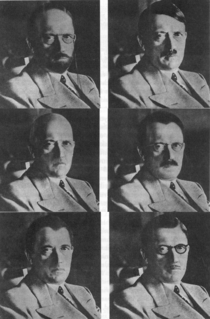
Conspiracy theories about the death of Adolf Hitler, dictator of Germany from 1933 to 1945, contradict the accepted fact that he committed suicide in the Führerbunker on 30 April 1945. Stemming from a campaign of Soviet disinformation, most of these theories hold that Hitler and his wife, Eva Braun, survived and escaped from Berlin, with some asserting that he went to South America. In the post-war years, the United States Federal Bureau of Investigation (FBI) and Central Intelligence Agency (CIA) investigated some of the reports, without lending them credence. The 2009 revelation that a skull in the Soviet archives long (dubiously) claimed to be Hitler's actually belonged to a woman has helped fuel conspiracy theories.
References
- ↑ "Inédit : "Apocalypse Hitler" dès le mardi 25 octobre sur France 2". Newstele (in French). October 4, 2011. Retrieved August 30, 2020.
- 1 2 3 "Nueva entrega de "Apocalipsis", la serie sobre Hitler, a partir de enero". National Geographic Spain (in Spanish). December 16, 2011. Retrieved August 30, 2020.